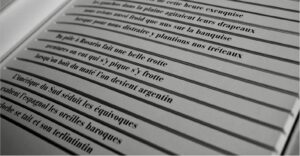Language, with its infinite complexities and nuances, serves as both a mirror of human thought and a canvas for creative expression. Within the realm of literature, certain works transcend the conventional boundaries of linguistic exploration, offering insights into the very fabric of communication itself. One such masterpiece is Cent mille miliards de poémes by the ingenious mind of French writer Raymond Queneau—an enigmatic creation that challenges the fundamental principles of linguistic structure and possibility.
Just imagine a literary work so expansive that even the most voracious reader could never reach its end in a single lifetime.
At first glance, Cent mille miliards de poémes appears deceptively modest – a mere ten pages nestled within its covers. Yet, within these seemingly limited confines lies an unparalleled feat of creativity and mathematical precision. In fact, each page houses a sonnet, meticulously composed with a shared rhyme scheme, waiting to be rearranged in a myriad of combinations.
The genius of Queneau’s creation lies in its modular design. Each sonnet is sliced into strips, allowing for the seamless intermingling of verses from different poems. This ingenious structure gives rise to an astonishing realization: despite its brevity, Cent mille miliards de poémes – A Hundred Thousand Billion Poems, the English version by Stanley Chapman- contains a staggering one hundred billion possible poems.

Raymond Queneau, Cent mille milliards de poèmes (1961).
The implications of this boundless potential are profound. No matter how fervently one may endeavor, the task of reading the entire book in a single lifetime becomes an impossibility. Even dedicating every waking moment to the pursuit would scarcely scratch the surface of its infinite tapestry of verse.
Consider the sheer magnitude of the challenge posed by Queneau’s creation: if one were to spend an average of 45 seconds reading each sonnet and an additional 15 seconds preparing the next, it would require approximately two hundred million years to traverse the entirety of Cent mille miliards de poémes. Such a monumental endeavor transcends the limitations of human lifespan, rendering it a quest for the ages.
Yet, the allure of Queneau’s opus extends far beyond its mathematical marvel as, embedded within its labyrinthine structure, lies a treasure trove of poetic possibilities, waiting to be unearthed by intrepid explorers of the written word. Each permutation offers a unique glimpse into the boundless creativity of the human spirit, a testament to the enduring power of language to captivate and inspire.

Moreover, the act of engaging with Cent mille miliards de poémes transcends mere literary consumption—it becomes an interactive dialogue between reader and text. With each rearrangement of verses, new meanings emerge, offering fresh insights and interpretations with every iteration. It is a testament to the dynamic nature of literature, forever evolving in the hands of those who dare to explore its depths.
One cannot help but marvel at the ingenuity of Queneau’s vision, a vision that transcends the confines of traditional storytelling to embrace the infinite possibilities of language itself. In a world governed by constraints and limitations, this perfect masterpiece stands as a beacon of boundless potential, inviting readers to embark on a journey of exploration and discovery unlike any other.
As we ponder the timeless allure of it, we are reminded of the enduring power of literature to transcend the boundaries of time and space. In its pages, we find not only a celebration of language and creativity but also a profound meditation on the infinite nature of human imagination. It is a work that continues to inspire and captivate, beckoning readers to unlock its secrets and embark on a journey of literary exploration unlike any other.
So, at its core, linguistics seeks to unravel the mysteries of language: its origins, evolution, and the myriad ways in which it shapes human interaction and understanding. Cent mille miliards de poémes presents an unparalleled opportunity for linguistic inquiry, serving as a microcosm of the intricate interplay between form and meaning within the poetic tradition.
If you want to try reading at least a part of these wonderful combinations, you can find the book in French version on Amazon UK just clicking here (https://amzn.eu/d/4Zussak)
Ig – @fairness_mag

